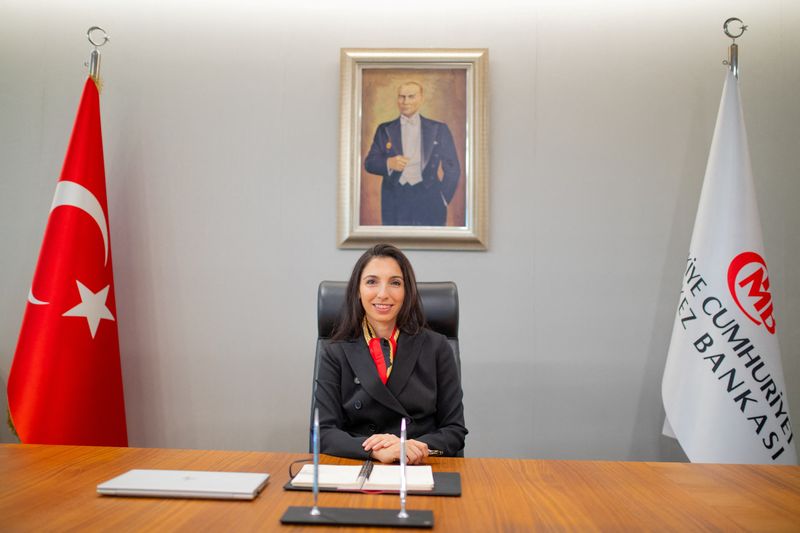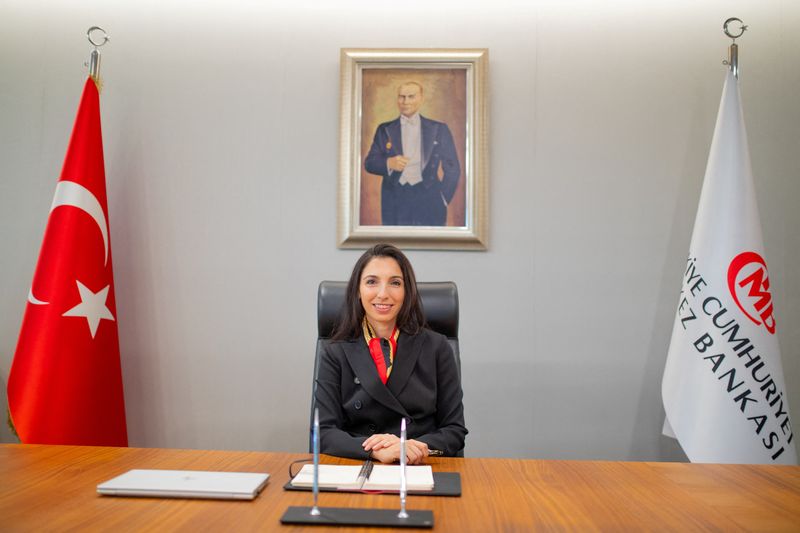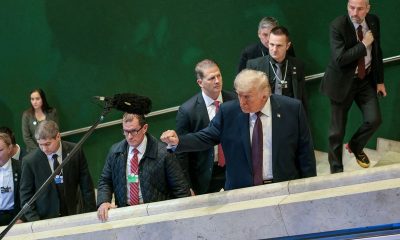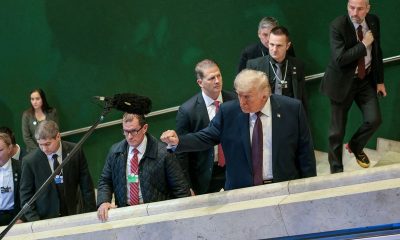Economy
Analysis-Going holistic: Turkey’s new central bank chief pitches comprehensive policy


© Reuters. Turkey’s Central Bank Governor Hafize Gaye Erkan poses in her office in Ankara, Turkey, July 6, 2023. Central Bank of Turkey/Handout via REUTERS/File photo
By Karin Strohecker and Jorgelina do Rosario
LONDON (Reuters) – Turkey’s new central bank chief pitched a comprehensive monetary policy in her first formal address to the media while her acknowledgment of stark inflation pressures was welcomed by foreign investors.
Laying out her philosophy in her debut news conference, Hafize Gaye Erkan pledged that her holistic approach would – in addition to interest rate hikes – make use of a range of levers and macroprudential policy tools, potentially including curbs on loan growth in key sectors or credit card spending.
Erkan, who was appointed in early June after President Tayyip Erdogan secured another term in office, vowed on Thursday to continue the gradual monetary tightening and more than doubled the bank’s end-2023 inflation forecast to 58.0% from 22.3%.
Her comments follow two smaller-than-expected interest rate hikes under her auspices in June and July – which lifted the benchmark to 17.5% – well behind inflation which ran at just below 40% in May.
But it was the repeated use of the word holistic – or “bütüncül” – by the former Goldman Sachs (NYSE:) banker and Turkey’s first female central bank chief that caught most of the attention.
“That’s the buzzword – holistic,” said Kaan Nazli, a portfolio manager at asset manager Neuberger Berman, who noted her emphasis on a slowdown in domestic loan growth – a lever to tighten policy outside the lifting of lending rates.
Under Erkan, the central bank has begun to simplify a complex set of macroprudential measures – those aimed at ensuring financial system’s stability – implemented under the former governor and has supported the rate hikes with qualitative and selective credit tightening.
“We are making the gradual and steady rate hikes more holistic and stronger through quantitative tightening and selective credit tightening,” Erkan told the news conference.
Erkan forms the country’s top economic team together with respected veteran policymaker Mehmet Simsek who returned to head Turkey’s Finance Ministry after the election. Both are expected to tackle economic strains that have sent the lira to consecutive record lows, embedded double-digit inflation and vaporised tens of billions of dollars of foreign exchange reserves.
Tim Ash, a strategist at BlueBay Asset Management said he had counted the new governor using the word eight times, earning her the nickname “Holistic Hafize” while her message to markets was that policy makers would opt for learning and calibrating in their decision making rather than shock-and-awe moves.
“The market just does not think that Simsek and Erkan have a mandate to do whatever it takes to fight inflation, at least not when it comes to policy rates, and that Erdogan is still the rate setter,” said Ash.
While a “holistic” approach sounded nice, said Ash, it was “really just a sanitised and alternative word for “unorthodox”.
SMOOTH PERFORMANCE
There was broad agreement among investors that Erkan is facing an uphill struggle with her strategy unlikely to deliver a swift pivot towards economic orthodoxy after years of Erdogan pushing for lower interest rates as a remedy for high inflation.
Her approach “is going to be a difficult sell,” said Marek Drimal, strategist at Societe Generale (OTC:). “Unless the credit and monetary tightening really kick in, investors would expect the central bank to hike more aggressively,” he said.
Sceptical about her policies, analysts still praised Erkan’s performance at the more than hour-long news conference.
Unlike some of her predecessors, Erkan chose to answer all the questions at the news conference herself, rather than defer them to her colleagues, switching easily between Turkish and English during the live event.
“She clearly wants to be the face of Turkish monetary policy making,” said Neuberger Berman’s Nazli.
She swerved politically charged questions on the influence of Erdogan’s government on monetary policy making – a thorny issue for the nation of 85 million where many are reeling under a cost of living crisis.
Emre Akcakmak at East Capital, said that Erkan’s inaugural conference left the impression of a competent policy maker with realistic expectations.
“She didn’t go into this fight with the past. She didn’t talk about the previous management. She could have talked about the mess that she’s in,” he said.
“We saw a person who seems to be capable of being a central bank governor, compared to previous governors, but cautious.”
Economy
Russian central bank says it needs months to make sure CPI falling before rate cuts -RBC


© Reuters. Russian Central Bank Governor Elvira Nabiullina attends a news conference in Moscow, Russia June 14, 2019. REUTERS/Shamil Zhumatov/File Photo
MOSCOW (Reuters) – Russia’s central bank will need two to three months to make sure that inflation is steadily declining before taking any decision on interest rate cuts, the bank’s governor Elvira Nabiullina told RBC media on Sunday.
The central bank raised its key interest rate by 100 basis points to 16% earlier in December, hiking for the fifth consecutive meeting in response to stubborn inflation, and suggested that its tightening cycle was nearly over.
Nabiullina said it was not yet clear when exactly the regulator would start cutting rates, however.
“We really need to make sure that inflation is steadily decreasing, that these are not one-off factors that can affect the rate of price growth in a particular month,” she said.
Nabiullina said the bank was taking into account a wide range of indicators but primarily those that “characterize the stability of inflation”.
“This will take two or three months or more – it depends on how much the wide range of indicators that characterize sustainable inflation declines,” she said.
The bank will next convene to set its benchmark rate on Feb. 16.
The governor also said the bank should have started monetary policy tightening earlier than in July, when it embarked on the rate-hiking cycle.
Economy
China identifies second set of projects in $140 billion spending plan


© Reuters. FILE PHOTO: Workers walk past an under-construction area with completed office towers in the background, in Shenzhen’s Qianhai new district, Guangdong province, China August 25, 2023. REUTERS/David Kirton/File Photo
SHANGHAI (Reuters) – China’s top planning body said on Saturday it had identified a second batch of public investment projects, including flood control and disaster relief programmes, under a bond issuance and investment plan announced in October to boost the economy.
With the latest tranche, China has now earmarked more than 800 billion yuan of its 1 trillion yuan ($140 billion) in additional government bond issuance in the fourth quarter, as it focuses on fiscal steps to shore up the flagging economy.
The National Development and Reform Commission (NDRC) said in a statement on Saturday it had identified 9,600 projects with planned investment of more than 560 billion yuan.
China’s economy, the world’s second largest, is struggling to regain its footing post-COVID-19 as policymakers grapple with tepid consumer demand, weak exports, falling foreign investment and a deepening real estate crisis.
The 1 trillion yuan in additional bond issuance will widen China’s 2023 budget deficit ratio to around 3.8 percent from 3 percent, the state-run Xinhua news agency has said.
“Construction of the projects will improve China’s flood control system, emergency response mechanism and disaster relief capabilities, and better protect people’s lives and property, so it is very significant,” the NDRC said.
The agency said it will coordinate with other government bodies to make sure that funds are allocated speedily for investment and that high standards of quality are maintained in project construction.
($1 = 7.1315 renminbi)
Economy
Russian central bank says it needs months to make sure CPI falling before rate cuts -RBC


© Reuters. Russian Central Bank Governor Elvira Nabiullina attends a news conference in Moscow, Russia June 14, 2019. REUTERS/Shamil Zhumatov/File Photo
MOSCOW (Reuters) – Russia’s central bank will need two to three months to make sure that inflation is steadily declining before taking any decision on interest rate cuts, the bank’s governor Elvira Nabiullina told RBC media on Sunday.
The central bank raised its key interest rate by 100 basis points to 16% earlier in December, hiking for the fifth consecutive meeting in response to stubborn inflation, and suggested that its tightening cycle was nearly over.
Nabiullina said it was not yet clear when exactly the regulator would start cutting rates, however.
“We really need to make sure that inflation is steadily decreasing, that these are not one-off factors that can affect the rate of price growth in a particular month,” she said.
Nabiullina said the bank was taking into account a wide range of indicators but primarily those that “characterize the stability of inflation”.
“This will take two or three months or more – it depends on how much the wide range of indicators that characterize sustainable inflation declines,” she said.
The bank will next convene to set its benchmark rate on Feb. 16.
The governor also said the bank should have started monetary policy tightening earlier than in July, when it embarked on the rate-hiking cycle.

 Forex4 years ago
Forex4 years agoForex Today: the dollar is gaining strength amid gloomy sentiment at the start of the Fed’s week

 Forex3 years ago
Forex3 years agoUnbiased review of Pocket Option broker

 Forex3 years ago
Forex3 years agoDollar to pound sterling exchange rate today: Pound plummeted to its lowest since 1985

 Forex3 years ago
Forex3 years agoHow is the Australian dollar doing today?

 Cryptocurrency3 years ago
Cryptocurrency3 years agoWhat happened in the crypto market – current events today

 World3 years ago
World3 years agoWhy are modern video games an art form?

 Commodities3 years ago
Commodities3 years agoCopper continues to fall in price on expectations of lower demand in China

 Economy3 years ago
Economy3 years agoCrude oil tankers double in price due to EU anti-Russian sanctions

























